|
Type 2 diabetes doesn’t usually appear all of a sudden. Many people have a long, slow, invisible lead-in to it called pre-diabetes. During this period, blood sugar levels are higher than normal. However, they’re not high enough to cause symptoms or to be classified as diabetes. It’s still possible at this stage to prevent the slide into full-blown diabetes. Pre-diabetes is a wakeup call and with strict lifestyle modification one can reverse the condition or prevent the ravages of diabetes. One reason many people don’t know that they may be headed toward diabetes is they’ve never had their blood sugar tested. This simple test, strangely, isn’t part of routine preventive care. To hear the wake up call, timely screening of diabetes is a must. Who should get screened?
Getting the wake-up call of pre diabetes can be very useful. A three-part strategy can keep people with it from ever getting diabetes. The strategy includes modest weight loss, increased physical activity, such as walking 30 minutes a day, and choosing a healthier diet. In addition to helping stave off diabetes, these lifestyle changes can also help protect against heart attack, stroke, bone-thinning osteoporosis, and a host of other chronic conditions. Six simple steps one can take once you hear the wake-up call:
2 Comments
K V SURYA MOHAN
7/27/2016 01:32:10
The Article has come a tad too late for me. I am already a diabetic although it is managed and kept in control. How does one prevent it when your Genes are heavily biased against you and your parents have both passed on the legacy to you ??
Reply
Pariksha
7/27/2016 05:34:46
I agree, we can't change the genes that we are born with. Hence we need more pro active approach. Now that people are becoming more and more aware about risk factors for diabetes an early screening is recommended. Making next generations more cautious and alert regarding this silent disorder.
Reply
Leave a Reply. |
Author
|





 RSS Feed
RSS Feed
